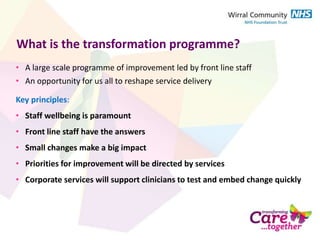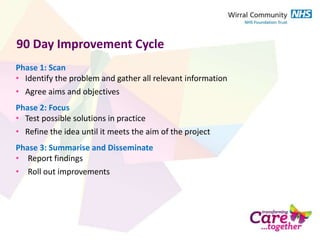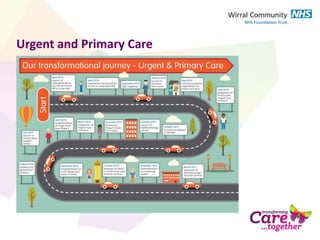Transformation care together - presentation
- 1. Sandra Christie Director of Nursing and Performance Sandra Christie Director of Nursing and Performance
- 2. Why do we need a transformation programme? • Changing Demographics – we need to locally address the issue that the number of people over 65 with care needs is projected to increase by 60% • Advances in technology and innovation – we need to develop the skills to lead innovation and adopt new technologies • Social, political, economic and environmental factors – we need to respond to the growing challenge of balancing quality and cost • Patient and staff expectations – we need to understand how expectations are changing and engage in designing a new system together
- 5. What is the transformation programme? • A large scale programme of improvement led by front line staff • An opportunity for us all to reshape service delivery Key principles: • Staff wellbeing is paramount • Front line staff have the answers • Small changes make a big impact • Priorities for improvement will be directed by services • Corporate services will support clinicians to test and embed change quickly
- 7. 90 Day Improvement Cycle Phase 1: Scan • Identify the problem and gather all relevant information • Agree aims and objectives Phase 2: Focus • Test possible solutions in practice • Refine the idea until it meets the aim of the project Phase 3: Summarise and Disseminate • Report findings • Roll out improvements
- 11. Urgent and Primary Care
- 12. Structural transformation • key focus is Estates rationalisation minimises impact on workforce supports integration • for 2016/17 we will save: £240k • this equates to eight Band 5 frontline staff
- 13. Agile working • most services now have mobile working kit enables more flexible working – less reliant on office space • future of healthcare will rely on better use of IT • result will be staff working more flexibly to: meet patients individual needs be less reliant on buildings and premises
- 14. How can I get involved? • If you are keen to get involved, contact your team leader, service lead or deputy divisional manager • Each division has a transformation team and clinical reference group as well as quality improvement teams for each project • Visit the transformation page on Staff zone













